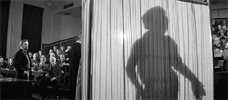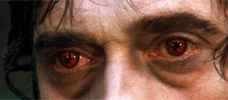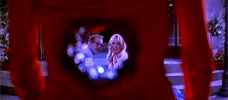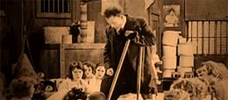Reviews
Do Not Disturb
Dick Maas
Germany / The Netherlands, 1999
Credits
Review by Jenny Jediny and Adam Balz
Posted on 30 October 2007
Source Sterling Home Entertainment VHS
Related articles
Features Dark Passages: The Films of Dick Maas
Reviews The Lift
Reviews Amsterdamned
Reviews The Shaft
Categories 31 Days of Horror
Jenny’s thoughts:
The last victim - and therefore an obvious one - expected in the Dick Maas oeuvre is a child, considering the director’s affinity for far more saucy, R-rated themes. However, a young girl, and a mute one at that, is the sole observer to bloody murder in Silent Witness, and soon after a target herself. Maas centers the action once again in his precious Amsterdam, but this time has an American cast in tow; Walter (William Hurt) and Cathryn (Jennifer Tilly) Richmond are visiting Amsterdam on a business trip when their ten-year old-daughter Melissa goes astray, comes across and then flees a murder scene. With her father and the police doubting her wild imagination, Melissa is left to her own devices when the murderer follows her back to her hotel.
Directed prior to his New York-based feature, The Shaft, Maas here immerses an American family into European culture in a Maas-ified fashion; while stereotyping the typical American family with Walter’s southern accent (it comes and goes), a high degree of impatience, and acute xenophobia while traveling abroad, Maas inevitably turns the Richmond’s ignorance against them. At the start of their journey, Cathryn emphasizes her travel fears after observing in one anonymous paper or another, that Amsterdam is a crime-ridden and “extremely dangerous” city. Her fear of bringing Melissa into a supposedly toxic environment becomes a bit ironic, as her husband peddles pharmaceuticals, not exactly the cleanest form of living (as the business connected murder soon proves).
With her whining, Cathryn unwittingly condemns her daughter to what may be the worst vacation imaginable for a young girl. Not only does Melissa watch a man clumsily pummeled to his death, but she stumbles into a backwards, and rather sordid combination of Nancy Drew and Alice in Wonderland. Fleeing the scene, Melissa is rescued by a semi-homeless drug addict (a bizarre cameo by comedian Denis Leary) after tumbling onto his canal boat, but after finding her way to the police, not only is her eyewitness testimony doubted, but the investigating officers make lewd comments about “slapping her around a bit” and insinuate that perhaps Melissa ran off to spend “quality time” with a boy. Maas doesn’t let up on the crude sex jokes, even though Melissa couldn’t look further from puberty in her baggy outfits; later in the film, Melissa manages to hide from her stalker in the hotel room of a visiting rock star, Billy Boy Manson, who reveals his eager, pedophilic penchant to the baffled girl while cartoons play in the background (he also protests when he believes the police are at the door that he thought Amsterdam was a “tolerant” city). The vulgar attitudes are more frightening (well, at least disturbing and icky), than the actual hunting of Melissa by the murder’s henchman.
Silent Witness strays from the horror genre into “attempted” suspense, with several chase sequences, room switching, and characters trying to conceal themselves in dark corners. The “attempt” is in the spoofs Maas pulls, taking away the tension in favor of exaggerated interludes of humor, whether it’s the hitman fussing with his gun or a throwaway reference to De Lift, as Melissa uses an elevator as an escape route. While there is established tension (particularly in a chase scene involving Walter, a gurney-ridden Melissa and a runaway ambulance), much of the film is too self-aware to be entirely defined by one genre or the other. Certainly, this seems to be the very case with the director himself; fully aware of cinema’s conventions, Dick Maas never seems content unless toying with them, poking fun at both himself and his audience.
Adam’s thoughts:
Halfway through Dick Maas’ Silent Witness, a stripper falls off a chair. This moment has absolutely nothing to do with the plot, and it contributes zilch to character development: this clumsy dancer has no name and is never seen again. Yet it typifies the director’s love of unbefitting humor, prevalent throughout all of his favored works.
Billed as a dramatic thriller, Silent Witness is at times more like an unfocused Home Alone melodrama. The two villains - a greedy businessman and his hired gun - are bumbling idiots; it takes them almost three attempts to complete their first murder, and the range of utilized weaponry - a gun, a knife, a shovel, concrete - is amusingly clever. A man being murdered suddenly becomes hilarity. From there the film transforms into a seemingly typical collection of chase sequences, interrupted frequently by moments of lucid calm: A married American couple, played by William Hurt and Jennifer Tilly, worrying about their daughter and dining with the aforementioned businessman, who takes repeated cell-phone breaks to inform his cohort as to the location of that same daughter. She, as it turns out, witnessed the prolonged hit. She is also, as you may have already guessed, mute.
Maas is, as should now be apparent, no stranger to irony. In fact, he seems to be the concept’s strange Dutch bedfellow. Silent Witness succeeds almost entirely on its coincidental imagery: The fact that young, mute Melissa Richmond, whose mother expressed concern over Amsterdam’s seedy reputation, is saved not once but twice by a drug-addicted and jobless pickpocket. Or that the businessman makes his final violent stand in a vehicle usually associated with health and rescue. Maas relishes in joining two contrasting images and watching the tension build.
And Maas is a craftsman of suspense. The film’s most recognized scene, in which William Hurt’s Walter Richmond dangles from the side of an ambulance as it speeds through Amsterdam, is gripping—one of the best chase scenes ever put to film. This is due almost entirely to Maas’ complete dismissal of flashy editing techniques. When the ambulance propels cars into barriers, a streetcar into storefronts, and thunders under a low-lying bridge, Maas keeps the camera focused rather than using slow-motion or rapid cuts; in one instance we can even see the foam-faced mannequin ricocheting in its seat as its car wraps around a concrete traffic pylon.
After viewing most of Maas’ other works - the Flodder films are oddly absent from American circulation - I was surprised by the uncharacteristically kitschless performances, almost as though Maas were actually trying to direct a standard adrenaline-driven thriller. Michael Chiklis as the balding, hyperkinetic businessman is wildly Schumacherian, while both Hurt and Tilly’s Richmond parents are genuinely complex, if not slightly moronic. The storyline, while at times playing like a chic Hitchcock homage, has its own moments of originality, such as Michael Goorjian’s pederast rock star. But, not to let Maas’ devoted fan-base down, there is always the awkward stripper.
More 31 Days of Horror
-

Alien
1979 -

The Elephant Man
1980 -

My Bloody Valentine
1981 -

Who Can Kill a Child?
1976 -

Cannibal Holocaust
1980 -

Let Sleeping Corpses Lie
1974 -

John Carpenter’s Vampires
1998 -

Jaws 2
1978 -

A Warning to the Curious
1972 -

Wolf
1994 -

The Survivor
1981 -

Cannibal Ferox
1981 -

The Nights of Terror
1981 -

Death Becomes Her
1992 -

Alice, Sweet Alice
1976 -

Body Double
1984 -

Invocation of My Demon Brother
1969 -

Phantasm II
1988 -

Emanuelle and the Last Cannibals
1977 -

The Wicker Man
1973 -

Maniac Cop
1988 -

The Legend of the 7 Golden Vampires
1974 -

The Penalty
1920 -

Boxing Helena
1993 -

Chew on This
2005 -

Night of the Creeps
1986 -

Night of the Lepus
1972 -

Near Dark
1987 -

Army of Darkness
1992 -

The Brood
1979 -

The Lift
1983 -

Amsterdamned
1988 -

Silent Witness
1999 -

The Shaft
2001
We don’t do comments anymore, but you may contact us here or find us on Twitter or Facebook.



